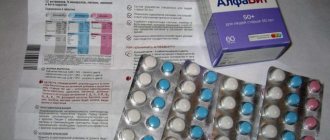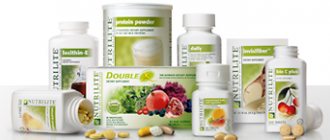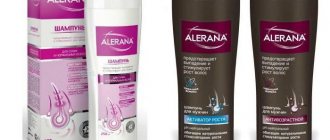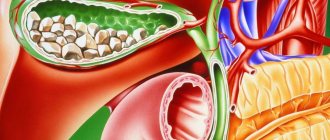At preschool age, children need the maximum amount of vitamins and minerals. Since nutrition does not fully meet the growing body’s need for them, one has to resort to multivitamin preparations. Vitamins "Alphabet Kindergarten" are considered one of the most effective among similar drugs. Their production was based on results obtained from laboratory research procedures showing the effects of separate and combined intake of beneficial components.
Release form and composition
Vitamins Alphabet Kindergarten are produced in the form of chewable tablets weighing 1 g, one set includes 3 tablets with different tastes: No. 1 - with apple flavor, yellow-green color, No. 2 - with orange flavor, yellow-orange color, No. 3 – strawberry flavored, pink [12 pcs. (4 tablets of three colors) in a blister, in a cardboard pack of 3 or 5 blisters].
In 1 tablet the content of active components is:
- No. 1 (yellow-green): vitamin A (beta-carotene) – 0.9 mg, vitamin C (ascorbic acid) – 20 mg, vitamin B1 (thiamine hydrochloride) – 0.9 mg, vitamin B9 (folic acid) – 0.08 mg, minerals: copper (copper citrate) – 0.55 mg, iron (iron orthophosphate) – 5 mg;
- No. 2 (yellow-orange): vitamin A (beta-carotene) – 0.9 mg, vitamin C – 20 mg, vitamin B6 (pyridoxine hydrochloride) – 1 mg, vitamin PP (nicotinamide) – 7 mg, vitamin E ( alpha tocopherol acetate) – 5 mg, vitamin B2 (riboflavin) – 0.8 mg, minerals: magnesium (magnesium oxide) – 25 mg, zinc (zinc citrate) – 5 mg, iodine (potassium iodate) – 0.03 mg, selenium (potassium iodate) – 0.02 mg, manganese (manganese gluconate) – 0.5 mg;
- No. 3 (pink): vitamin B9 (folic acid) – 0.08 mg, vitamin B₅ (calcium pantothenate) – 2.5 mg, vitamin B12 (cyanocobalamin) – 0.001 mg, vitamin D3 (cholecalciferol) – 0.0025 mg or 100 IU (international unit), mineral: calcium (calcium carbonate) – 90 mg.
Excipients: dextrose roferose, sodium citrate, citric acid (E 330), aerosil (E 551), fibrulose, glycerin (E 422), calcium stearate (E 470), croscarmellose sodium (E 468), maltodextrin (E 1400), fibrulin, polyvinylpyrrolidone (E 1201), vaseline oil (E 905), natural food dyes - carmine (E 120) and chlorophyll copper complexes (E 141), identical natural food flavors - “vanilla”, “apple”, “orange”, "strawberry".
Compound
Tablet No. 1 (cherry flavor)
Vitamins:
- C - 30 mg (50%);
- B1 - 0.7 mg (75%);
- A (1000 IU) - 0.3 mg (45%);
- folic acid - 50 mcg (25%).
- iron - 10 mg (100%);
- copper - 0.7 mg (45%).
- C - 30 mg (50%);
- Nicotinamide (PP) - 9 mg (75%);
- E - 6 mg (85%);
- B2 - 0.8 mg (80%);
- B6 - 0.7 mg (55%);
- A - (1000 IU) - 0.3 mg (45%).
- magnesium - 30 mg (15%);
- zinc - 5 mg (63%);
- iodine - 50 mcg (70%);
- selenium - 20 mcg (100%).
- calcium pantothenate - 2 mg (50%);
- folic acid - 50 mcg (25%);
- B12 - 0.5 mcg (75%);
- D3 (25 IU) - 0.6 mg (6%).
- calcium - 100 mg (10%).
Minerals:
Tablet No. 2 (orange flavor)
Vitamins:
Minerals:
Tablet No. 3 (banana flavor)
Vitamins:
Minerals:
% - percentage of the norms of physiological needs for children over 7 years old.
Pharmacological properties
Pharmacodynamics
Alphabet Kindergarten is a vitamin and mineral complex developed specifically for children aged 3–7 years in the form of a biologically active food supplement. The active components of the product are divided into 3 tablets according to the nature of substance compatibility and interaction. Separate intake of tablets with an interval of 4-6 hours allows vitamins and minerals to be fully absorbed, increasing their effectiveness and ensuring the product is hypoallergenic.
The product contains no artificial colors and does not cause allergic reactions.
Action
Alphabet Shkolnik is the world's first vitamin and mineral complex for children over 7 years old, created taking into account the interaction of components. This increases the effectiveness of vitamin prophylaxis by more than 30% and ensures hypoallergenicity.
Alphabet Shkolnik reliably provides the child with the vitamins and minerals necessary for his development. The composition and dosage were developed by the Research Institute of Nutrition of the Russian Academy of Medical Sciences based on the latest scientific achievements. Does not contain artificial colors. The colors of the tablets are determined by the vitamins and minerals they contain.
Efficiency and safety depend decisively on taking into account the interaction of components. This is an elementary truth of modern medicine.
How can we take into account the interaction of components? Vitamins and minerals interact during storage, during absorption and during the implementation of biological functions in the body, which can lead to the loss of activity of some of them, and, consequently, their beneficial properties.
Negative interactions during storage (for example, oxidation of some components of the tablet even before it is taken) can be prevented using known methods: multilayer tableting, microencapsulation, etc. But the interaction of components in the digestive tract and in the internal environment of the body cannot be eliminated using similar methods. It is physiologically necessary, and this is required by strict pharmaceutical standards, for the vitamin-mineral complex tablet to completely dissolve within 1 hour. The process of assimilation of vitamins and minerals lasts 4-6 hours, and during this time the negative interactions are fully manifested. Thus, they can only be avoided by taking the antagonistic components of the complex at different times.
When creating the Shkolnik Alphabet, all facts known to science about the interaction of vitamins and minerals were collected and systematized. Taking into account these data, the complete set of components was divided into three tablets, each of which contained only compatible substances. Antagonist substances are found in different tablets. When taking the tablets separately, all vitamins and minerals will be completely absorbed, which means the effectiveness of the complex will increase.
What is the benefit of separate intake?
1. Provides higher efficiency compared to traditional (single-tablet) drugs:
2. The likelihood of developing a number of undesirable reactions is excluded:
- the oxidative reaction between vitamins C and B12 disrupts the entire process of absorption of the latter (not only from drugs, but also from food);
- Vitamin B1 can cause an allergic type reaction, and the presence of vitamin B12 can aggravate it.
3. The benefits of synergy remain when the components of the drug work better together than separately:
- Vitamin D promotes optimal absorption and efficient use of calcium;
- calcium helps the absorption of vitamin B12;
- Vitamin C restores the protective (antioxidant) properties of vitamin E.
How to take Alphabet Shkolnik?
The daily dose consists of three tablets of different colors, taken at intervals of 4-6 hours during meals (for example, breakfast, lunch and dinner). The sequence of administration can be any. It is important that three tablets are taken during the day: red, orange, yellow.
Maximum effectiveness is achieved when taken separately. But if the child forgot to take one or two tablets on time, then the missed ones can be taken along with the next one or simply resumed with any tablet.
Alphabet Our Baby from 1.5 to 3 years
The supplement is available in powder form, which is packaged in 3 g sachets. Each package includes 45 sachets for 15 days of use.
Vitamins intended for early childhood are recommended for children with weak immune systems. A decrease in the body's defenses is manifested by frequent ARVI. Taking vitamins improves cognitive abilities, increasing the body's ability to resist environmental factors.
Attention! The positive effect of vitamins is manifested in the normalization of a child’s sleep.
Release form and composition
The Alphabet complex has the form of portioned packaged masses dissolved in liquid. Sachets of different colors should be used at different times of the day.
The “Our Baby” alphabet contains the following components:
- retinol;
- B1, B2, B5, B6, B9, B12;
- ascorbic acid;
- vitamin D3;
- tocopherol;
- RR;
- magnesium;
- calcium;
- iodine;
- iron;
- zinc.
Nutrients are distributed to ensure their maximum digestibility.
How to use
Each package contains sachets of different colors:
- red;
- green;
- blue.
The contents of the red bag are used in the morning, and the green and blue bags are used in the afternoon and evening, respectively. The interval between taking vitamins should be at least 5 hours.
Attention! Exceeding the permissible dosage can lead to the development of allergic reactions and hypervitaminosis.
Alphabet During the cold season for children, tablets No. 60
Product description
Alphabet During the cold season.
Release form
Chewable tablets of three types - 20 tablets of each type per package.
Compound
Tablet No. 1 (pink, cherry flavored): Vitamin C 25 mg Vitamin B1 0.9 mg Folic acid 100 mcg Iron 10 mg Copper 0.6 mg Lactulose 80 mg Dietary fiber 250 mg Tablet No. 2 (orange, orange flavored) vitamin C 25 mg Nicotinamide (vitamin PP) 7 mg vitamin E 7 mg vitamin B2 1 mg vitamin B6 1.2 mg Beta-carotene 3 mg Magnesium 37.5 mg Zinc 8 mg Manganese 1 mg Iodine 100 mcg Selenium 20 mcg Molybdenum 35 mcg Lactulose 200 mg Tablet No. 3 (white, apricot flavor) Pantothenic acid 3 mg Folic acid 100 mcg vitamin B12 1.5 mcg vitamin D3 10 mcg vitamin K1 55 mcg Biotin (vitamin H) 15 mcg Calcium 135 mg Chromium 15 mcg Lactulose 20 mg Dietary fiber 250 mg
pharmachologic effect
Vitamins to strengthen the immunity of children 3-14 years old during colds and flu. The composition includes all the necessary vitamins and minerals for the normal growth and development of the child. Enriched with prebiotics. No preservatives, artificial flavors or colors. Unlike other complexes, it was developed taking into account scientific recommendations for separate and joint intake of useful substances. As a result, the likelihood of allergic reactions is minimized, and vitamin prophylaxis is on average 30–50% more effective.
Indications for use
As an additional source of vitamins, macro- and microelements, including organic forms of zinc, chromium, copper and manganese, a source of prebiotics (lactulose and dietary fiber) for children from 3 to 14 years old.
Directions for use and doses
Children over 3 years old: 1 tablet of each type (No. 1, No. 2, No. 3) per day during meals (at breakfast, lunch and dinner in any order). Duration of treatment: 1 month.
Contraindications
Individual intolerance to components, hyperfunction of the thyroid gland.
special instructions
Persons with thyroid diseases and taking iodine preparations should consult an endocrinologist before use. Not a medicine. It is recommended to consult a doctor before use.
Storage conditions
Store in a dry place, protected from light and out of reach of children, at a temperature not exceeding 25°C.
Buy Alphabet During the cold season for children, tablets No. 60 at the pharmacy
Price for Alphabet During the cold season for children, tablets No. 60
Instructions for use for Alphabet During the cold season for children, tablets No. 60
Indications for use of Alphabet Kindergarten
The instructions for Alphabet Kindergarten indicate that these vitamins are intended for children 3-7 years old as an additional source of vitamins, micro- and macroelements.
Tablet No. 1 is called “Iron+”, as it contains iron, which prevents anemia, and vitamin B1, which is involved in energy metabolism.
Tablet No. 2 is called “Antioxidants+” because it contains vitamin A (in the form of beta-carotene, which is known to be better absorbed by the body), vitamins E and C, selenium and zinc - they strengthen the immune system and help the child’s body resist the effects of negative factors environment; and iodine is a very important element necessary for the proper physical and mental development of a child.
Tablet No. 3 is called “Calcium-D3+”, because. contains calcium and vitamin D3 - elements that promote growth, strengthen bones and teeth, and reduce the risk of developing rickets.
Analogs
There are no absolute analogues of Alphabet children's vitamins in terms of composition. This is due to the separation of useful components depending on the nature of their interaction.
Popular vitamin supplements include the following:
- Jungle;
- Multi-tabs;
- Supradin;
- Babyvit;
- Pikovit;
- class=”aligncenter” width=”640″ height=”377″[/img]
Side effects of Alphabet Kindergarten
According to numerous reviews from parents whose children have taken or are constantly taking Alphabet Kindergarten, these vitamins are tolerated very well and, if the dosage is observed, do not have any side effects. In extremely rare cases, due to hypersensitivity or intolerance to individual components of the complex, allergic reactions are possible. It should be noted that reported cases of allergies almost always occurred during an overdose, when children, in the absence of their parents, took vitamins in a dose many times higher than the norm. In any case, if any negative reactions occur on the part of the body, you need to consult a doctor, perhaps he will select a drug with a similar effect, but with a different composition of active ingredients.
Contraindications, side effects
Vitamins for children, like other biologically active drugs, have contraindications. The main ones are:
- individual intolerance to the components of the drug;
- hyperfunction of the thyroid gland;
- age group under three years.
In any case, before starting to use the drug, you should consult a specialist. In case of overdose of vitamin substances, allergic reactions are possible. Currently, this is the only side effect observed in preschoolers when the complex is taken incorrectly.
Analogues of Alphabet Kindergarten
Structural analogues, i.e. with the same composition as that of Alphabet Kindergarten does not exist today. All drugs in the Alphabet series became the first vitamin-mineral complexes in Russia, the development of which took into account positive and negative combinations of certain beneficial substances that affect the effectiveness of vitamin prophylaxis.
Due to their belonging to the same pharmacological group and the similarity of their mechanisms of action, the pharmaceutical industry produces many different vitamins.








